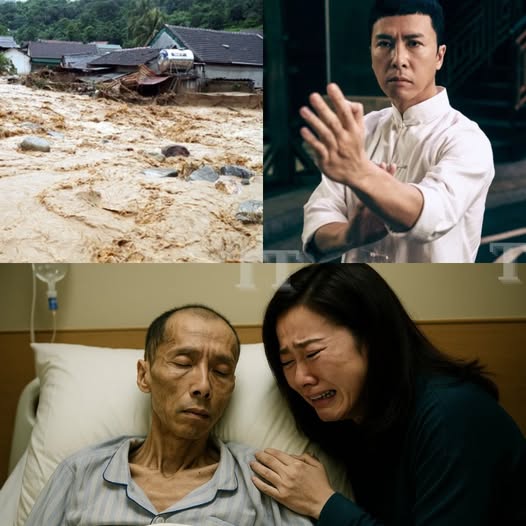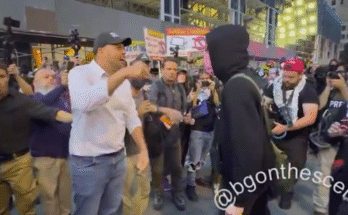
A Visit of Compassion Turns Emotional
The morning sky over Beijing was heavy with gray, its weight pressing gently against the city still recovering from the floods that had swept through its outskirts days earlier. Mud-caked roads lined with sandbags told a story of endurance and quiet suffering. But amid the wreckage, a moment of light appeared — Donnie Yen, dressed simply in a white shirt and waterproof boots, walking hand-in-hand with his wife, Cissy Wang, as they made their way through the relief site.
It was meant to be a gesture of compassion — one of many the actor and martial arts legend had made throughout his storied career. Local residents, still reeling from loss, recognized him instantly. Some wept. Others reached out to thank him for coming. “He didn’t just stand there and smile,” said Ms. Li, a 47-year-old resident whose home had been submerged waist-deep in floodwater. “He listened. He bent down to talk to an old man sitting on a broken chair. He helped lift boxes of supplies. You could feel that his heart was really there.”
What few knew then was that the quiet tremor in his hands, the brief pauses between his words, and the faint shadow behind his smile were not from exhaustion alone. Behind his calm exterior, Donnie Yen had been enduring a private battle — one he had chosen to keep away from cameras and headlines.
Half an hour after leaving the flood zone, the world would find out.

A Rare and Serious Illness
Reporters had gathered for what was supposed to be a brief follow-up interview in the lobby of a modest relief coordination center. As cameras rolled, Cissy Wang, ever composed beside her husband during countless public appearances, appeared unusually tense. Her voice trembled as she began to speak about compassion, gratitude, and the power of resilience — words that had long defined her husband’s philosophy.
But as she continued, emotion overtook her. She paused, clasped her hands together, and turned away from the microphones. Tears streamed down her face as she whispered, “He’s been fighting something… something very rare and very serious. But he never wanted anyone to know. He didn’t want sympathy — only to keep giving hope.”
The revelation stunned everyone in the room. Donnie, standing nearby, placed a reassuring hand on her shoulder, his expression calm — almost serene. He did not speak, but his silence said enough.
Sources close to the family later confirmed that the actor had been privately managing a degenerative condition — the kind that slowly tests the limits of one’s endurance and body control. Though the family did not disclose its name, those who had worked with him recently recalled noticing his quiet determination to conceal his discomfort.
“He would always say, ‘Pain is part of life. But compassion — that’s our choice,’” shared a longtime friend and film producer. “Even when he was struggling, he’d come to set earlier than everyone else. He’d train, stretch, and smile like nothing was wrong. That was Donnie.”
A Life of Discipline and Strength
To understand the gravity of that revelation is to remember who Donnie Yen has always been — not just a martial arts icon, but a symbol of control, precision, and resilience. From his breakout roles in Iron Monkey and Ip Man to his international acclaim in Rogue One: A Star Wars Story and John Wick 4, Yen built his reputation on an almost superhuman mastery of body and mind.
He was, for decades, the embodiment of discipline — a man who viewed every obstacle as an opportunity to refine himself. His cinematic fights were more than choreography; they were poetry in motion, discipline turned into art.
Behind that strength, however, lay a quieter truth. Friends have said that he often described martial arts as “the language of survival.” In interviews, he would remind young fans that “the greatest battle is not on screen — it’s inside you.”
Now, those words echo with haunting resonance.
Even as his illness progressed, Donnie continued to attend public events, train with younger actors, and advocate for arts education and children’s charities across Asia. “He refused to be defined by pain,” said a close confidant. “If anything, it made him more compassionate. He always said, ‘If I still have strength to stand, I’ll use it to lift someone else.’”
Family as His Anchor
For all his fame and global recognition, those closest to Donnie know that his true world has always been his family. His wife, Cissy Wang — model, entrepreneur, and the quiet force beside him for over two decades — has been his unwavering anchor.
In her emotional remarks, she spoke not only of his courage but of their shared vow to keep hope alive within their home. “He never wanted the children to see fear in our eyes,” she said softly. “He told us that love is the greatest medicine — that no illness can take that away.”
The couple’s children, Jasmine and James, have largely remained out of the public eye, shielded from the relentless attention that comes with their father’s fame. But those who know the family describe a household filled with laughter, warmth, and an almost sacred sense of normalcy.
“He’s a movie star to the world,” said a family friend, “but to them, he’s just Dad — the guy who burns toast, who tucks them in, who teaches them patience through play.”
Public Reaction and Support
As word of the revelation spread, social media across Asia lit up with messages of love, support, and disbelief. Within hours, hashtags like #StayStrongDonnieYen and #OurIpManForever trended across platforms. Fans posted clips of his films, sharing the lines that had inspired them over the years.
One viral post read: “He taught us that a warrior is not one who fights, but one who protects. Now it’s our turn to protect him.”
Actors from across Hong Kong and Hollywood — from Tony Leung to Keanu Reeves — expressed their support. Reeves wrote in a brief message, “Donnie is one of the kindest and most disciplined people I’ve ever met. He brings light wherever he goes. We’re all standing with him.”
Film directors spoke of his professionalism, crew members recalled his humility, and fans — from Manila to Montreal — shared stories of how his performances helped them through dark times.
The reaction was not one of pity, but of admiration. “He didn’t hide because he was ashamed,” wrote one fan in an open letter. “He stayed silent because he didn’t want to burden others. That silence was strength.”
Looking Ahead
As evening fell over Beijing, the floodwaters reflected the faint glow of rescue lights. Somewhere in the crowd that afternoon, Donnie Yen’s simple words lingered: “Even in hard times, we rise by lifting others.”
Now, those words carry new meaning. His visit — meant to comfort victims of a natural disaster — has instead reminded millions of the fragility and beauty of the human spirit.
Though the future of his health remains uncertain, one truth stands unwavering: Donnie Yen’s legacy has already transcended cinema. His life — a testament to discipline, empathy, and grace under pressure — continues to inspire across generations.
In a world often defined by spectacle, he has shown that real heroism is quiet, lived in moments of kindness and courage unseen by cameras.
As Cissy Wang said in closing that day, her voice steady despite her tears:
“He always believed that the strongest people are the ones who keep giving, even when they have every reason to stop. That’s who he is. That’s who he’ll always be.”
And as millions now echo her words across social platforms and city streets, one can almost hear the rhythm of his philosophy beating softly beneath it all — steady, unbroken, and profoundly human.
Even in pain, he stands taller than most.
And even in silence, he continues to speak to the world.


